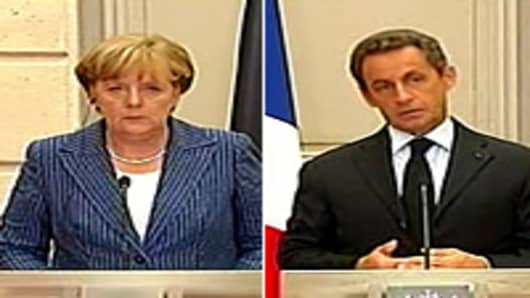The year ahead will see slow global economic growth combined with political uncertainty to create to a similar outlook for stock markets to 2011 with a significant chance of continued stock market volatility, according to a research note published by HSBC’s global head of equity strategy, Gary Evans.
Evans said uncertainty over the euro zone would persist well into next year and that it would ultimately only come to an end when Germany was forced to change its policy over euro bonds and European Central Bank asset purchases, most likely by a political or economic crisis.
“It is our experience that, when the only decisions are tough ones, politicians delay making them until a crisis forces them to,” Evans wrote.
“One possible scenario for the next few months, then, is that a complete collapse of confidence in the euro zone finally forces the German government to save the euro by dropping its opposition to fiscal transfers and debt monetisation."
“An alternative scenario is that markets rally each time there is a prospect of a euro-solution (as they did in July and October) but give back their gains when it becomes clear that the proposed measures are feeble. Meanwhile, the global economy will be a hostage to politicians’ actions (in the US, too, in an election year) – as well as facing its own structural headwinds from deleveraging,” he added.
Evans said that at present HSBC believed the global economy would avoid a recession in 2012, although there were headwinds in the form of a slowdown in the Chinese economy, with euro zone gross domestic product growth forecast to be 0.6 percent by the bank and US growth of 1.8 percent.
However, he also saw further risks to the downside if political chaos fed into consumer and corporate sentiment, with both consumers and corporate leaders unwilling to commit to spending decisions because of the uncertain environment.
“We continue to see stock markets remaining volatile and stuck within a trading range. They are likely to drop each time European sovereign funding issues resurface and each time there are questions over the sustainability of economic growth,” Evans added.
The HSBC note said the key questions for 2012 were whether stocks could be derated if risk rose even further and whether corporate earnings could continue to grow in the face of an uncertain economic environment.
“The answer to both questions is particularly difficult at the moment,” Evans wrote. “Back in the spring we set three conditions that we needed to see met before we could feel confident that the bull market would resume (the 20 percent correction in April to September technically tipped global equities into a bear market): an easing of event risk, in particular a solution to the European sovereign debt issue, but also including progress on the long-term US debt situation; clarity on the prospects for growth over the coming 12 months; and capitulation by investors.”
None of these issues had been resolved in the previous 12 months, Evans added, meaning they remained to be dealt with in 2012.
In terms of the euro zone, Evans noted that “ things that are considered politically feasible” in Europe does not overlap with “ things that might actually work”.
He said the German position on euro bonds and whether the ECB should be able to buy sovereign debt would eventually have to shift in 2012 as the extent of austerity measures proposed in countries like Greece and Italy proved to be politically impossible and “ultimately self defeating” He also warned if the German position did not change, the result would be the end of the euro project.
“In the end, we believe Germany will have to drop its objections – or be prepared to abandon the euro project. This is most likely to be done in a roundabout way. For example, the ECB is prohibited under the EU treaty from “monetary financing” (underwriting government bonds), but it is allowed to buy bonds in the secondary market for stabilization purposes – and indeed has bought 209 billion euros since May 2010,” Evans wrote.
“It could easily ramp up these purchases considerably. A resolution passed at the party congress of Merkel’s Christian Democratic Union (CDU) in November said ECB bond-buying was 'acceptable as a last resort. ' Germany might also agree to Eurobonds, if the funds were passed on only to countries that met deficit-reduction criteria,” he added.


